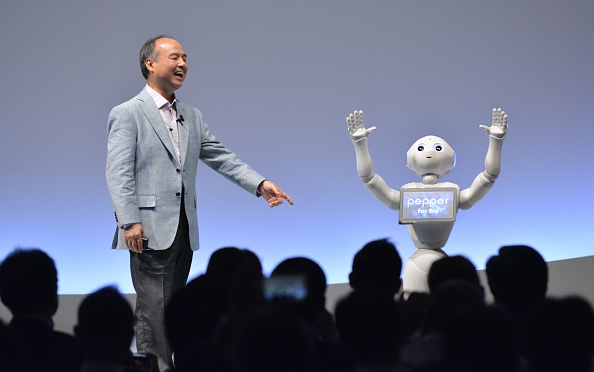8 Ways Robots Will Change Our Lives In The Next Decade

SoftBank Group representative Masayoshi Son and humanoid robot Pepper deliver a presentation at the SoftBank World 2015 in Tokyo.
We’ve heard that robots and intelligent machines could one day make the worker obsolete.
But artificial intelligence and other technologies are already changing the way we work, and in the next few years, will become an even larger part of our everyday lives. How? Jerry Kaplan, an author and fellow at CodeX: The Stanford Center for Legal Informatics, talked to us about some trends to watch in the coming years:
- Machine Learning. All sorts of programs and devices will be observing you in order to better adapt their own behavior to your preferences and needs. You can already watch Google search conform to your behavior as it observes your online activities. Google researchers are also working on a project they call “Google Brain” to accelerate this type of adaptive behavior. Teach your pet robot new tricks, or have fun watching it try to figure out how to climb up on the couch!
- Scene understanding. We now have low-cost cameras that take excellent pictures, but its still a challenge to automatically interpret what’s in those pictures. New AI software will be able to identify objects and events for us. For instance, a product manager will be able to scan not only messages on social media for mentions of their product but also pictures to see where their product appears. You could do a search for video that includes pictures of your school, for instance.
- Local area mapping. Low-cost laser sensors will allow you to make a detailed map of an object or space as easily as you now take a picture. New programs will then let you do things like “try out” different artwork or furniture in a 3D rendering of your living room so you can get a feel for it.
- Delivery robots. Self-driving cars are coming, but they can’t deliver packages to your door. Look for pizza robots (and all sorts of others) that fill this gap.
- Networks of Things/Internet of Things. Just about everything is going to have a wireless connection in it. This will open up all sorts of possibilities from monitoring the structural safety of bridges, to informing your car of approaching cross traffic, to reducing your total electricity use during peak hours by instructing different devices to power down. Light switches won’t have to be wired into the power line, so you can stick them on the wall or move them at will. Food in your refrigerator will tell you when it’s gone bad. Your paper towels will order more automatically when you start the last roll, or, your egg container will tell you when it’s time to restock.
- Swarm robotics. Tiny robots will collaborate together to get tasks done quickly and efficiently, like wiping dust or dirt off the leaves of your houseplants, collecting those M&Ms your kid spilled under the couch, possibly even cleaning plaque out of your arteries. Maybe we can finally stop those pesky ant invasions!
- Virtual reality. It’s finally ready for prime time. Facebook, among other companies like Oculus, plan to use this technology to better connect you with your friends … whether you want to or not. Get ready to attend your high-school reunion while on a business trip to Singapore.
- Mind control. No, not the bad kind. You’ll be able to control all sorts of things with your mind, with a little practice. Recent breakthroughs allow sensors that you might wear like a bathing cap to read signals in your brain to identify what objects, images, and actions you are thinking about. Really. Professor Jack Gallant does this work every day in his lab at the University of California at Berkeley. There’s a Disney startup accelerator that encourages this research, too. Play computer games the way you watch a movie, or type your term paper while eating a sandwich. Look ma, no hands!
Want more? Take a look into the future with our full show on how robots and artificial intelligence could change the way we work.


